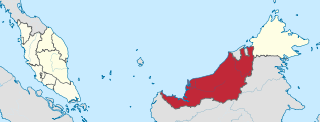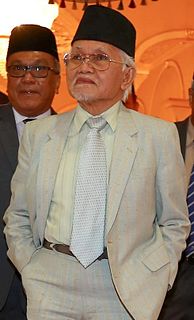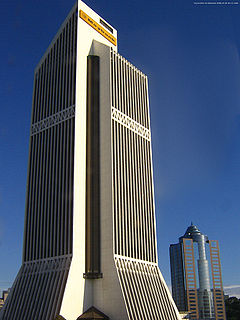| Governor of Sarawak Yang di-Pertua Negeri Sarawak | |
|---|---|
| Style | Tuan Yang Terutama (His Excellency) |
| Residence | The Astana, Jalan Astana Lot, Kampung Istana, 93500 Kuching, Sarawak |
| Appointer | Yang di-Pertuan Agong |
| Inaugural holder | Abang Haji Openg |
| Formation | 16 September 1963 |
The Yang di-Pertua Negeri of Sarawak is the ceremonial head of state of the Malaysian state of Sarawak. The Yang di-Pertua Negeri is styled Tuan Yang Terutama (TYT) (English: His Excellency).
A head of state is the public persona who officially represents the national unity and legitimacy of a sovereign state. Depending on the country's form of government and separation of powers, the head of state may be a ceremonial figurehead or concurrently the head of government. In a parliamentary system the head of state is the de jure leader of the nation, and there is a separate de facto leader, often with the title of prime minister. In contrast, a semi-presidential system has both heads of state and government as the leaders de facto of the nation.

Malaysia is a country in Southeast Asia. The federal constitutional monarchy consists of 13 states and three federal territories, separated by the South China Sea into two similarly sized regions, Peninsular Malaysia and East Malaysia. Peninsular Malaysia shares a land and maritime border with Thailand and maritime borders with Singapore, Vietnam, and Indonesia. East Malaysia shares land and maritime borders with Brunei and Indonesia and a maritime border with the Philippines and Vietnam. Kuala Lumpur is the national capital and largest city while Putrajaya is the seat of federal government. With a population of over 30 million, Malaysia is the world's 44th most populous country. The southernmost point of continental Eurasia, Tanjung Piai, is in Malaysia. In the tropics, Malaysia is one of 17 megadiverse countries, with large numbers of endemic species.

Sarawak is a state of Malaysia. The largest among the 13 states, with an area almost equal to that of Peninsular Malaysia, Sarawak is located in northwest Borneo Island, and is bordered by the Malaysian state of Sabah to the northeast, Kalimantan to the south, and Brunei in the north. The capital city, Kuching, is the largest city in Sarawak, the economic centre of the state, and the seat of the Sarawak state government. Other cities and towns in Sarawak include Miri, Sibu, and Bintulu. As of the 2015 census, the population of Sarawak was 2,636,000. Sarawak has an equatorial climate with tropical rainforests and abundant animal and plant species. It has several prominent cave systems at Gunung Mulu National Park. Rajang River is the longest river in Malaysia; Bakun Dam, one of the largest dams in Southeast Asia, is located on one of its tributaries, the Balui River. Mount Murud is the highest point in Sarawak.
Contents
- Appointment
- Functions, powers and privileges
- List of Yang di-Pertua Negeri Sarawak
- References
- See also
The official residence of the Governor is The Astana, located on the north bank of the Sarawak River in Kuching. [1]

The Astana is a palace in Kuching, Sarawak, Malaysia, on the north bank of the Sarawak River, opposite the Kuching Waterfront. It is the official residence of the Yang di-Pertua Negeri Sarawak, the Governor of Sarawak. The name is a variation of 'istana', meaning 'palace'. It was built in 1870 by the second White Rajah, Charles Brooke, as a wedding gift to his wife, Margaret Alice Lili de Windt. The palace is not normally open to the public, although the landscaped gardens are, which can be reach by a boat ride across the Sarawak River. It is part of the Kuching Heritage Trail.

The Sarawak River is a river in Sarawak, Malaysia. It is an important source of water and transportation for the inhabitants in southwestern Sarawak. It is also used in water-related sport activities such as the annual Sarawak Regatta which attract tourists from all over the world.

Kuching, officially the City of Kuching, is the capital and the most populous city in the state of Sarawak in Malaysia. It is also the capital of Kuching Division. The city is situated on the Sarawak River at the southwest tip of the state of Sarawak on the island of Borneo and covers an area of 431 square kilometres (166 sq mi) with a population about 165,642 in the Kuching North administrative region and 159,490 in the Kuching South administrative region—a total of 325,132 people.
The current office bearer, Abdul Taib Mahmud, was sworn in on 1 March 2014 and re-appointed as Governor on 28 February 2018 for the 2nd term.

Tun Pehin Sri Haji Abdul Taib bin Mahmud is the Yang di-Pertua Negeri of Sarawak, in office since 2014. Previously he was Chief Minister of Sarawak from 1981 to 2014. Taib was also the President of Parti Pesaka Bumiputera Bersatu (PBB), which was part of the Barisan Nasional coalition until 2018. He is of ethnic Melanau descent.







